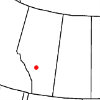
West Central Alberta Coldest, wettest edge | Thanks all for your thoughts and input, I see I'm not the only one pondering such ideas. I agree with Ed Winkle Spartanfan and others that a few years does not make a trend, but the trouble with trends is that they are not apparent until they are so entrenched that they are likely nearly over,just ask anyone following the markets, anyone can look back at a corn chart and call the bull and bear markets, but not many can state which they are in at the exact moment in time. I'm certainly not suggesting that 3 years of drought means the end of row crops in the mid west, but wondering how to recognize a new normal. There must be producers on here who have permanently lost land to some cause, such as salinity, erosion, flooding, or desertification( maybe not in North America?), how did you finally accept that the land would no longer produce, did it take successive failures, or just once, did you keep trying different things, or the same old, waiting for normal to return? I have some neighbors who crop some extremely flat heavy poorly drained land, and nearly every year as long as I can remember it is nearly a wipeout, yet they keep seeding it, I assume spurred on by memories of bumper crops which it has made in the past, as it would be exceptionally productive land if not for the one big rain event that inevitably happens. And I admit, I do some of the same thing on a smaller scale, knowing that the year I don't seed an extra round closer to the slough, it will be a dry year and I'll miss the best crop on the whole farm.
What is really scary is what happens when the world sees another sizable volcanic event such as Tambora in 1815, or Laki in 1783, or Huaynaputina in 1600, all of which devastated crops the world over with the slight cooling. There have been much more extreme events in the more distant past too. While the effect would be temporary, it could still last for a few years, how many would be brave enough to waste the precious seed a second or third year in a row after complete crop failures in a situation like that?
And Ed Winkle, how can you say you haven't read anyone who has a clue, what about Al Gore? Or our Canadian version David Suzuki, they and their flock seem quite certain about where the climate is headed, haven't you read them? Or you mean someone with credibility and without an agenda? |


 How would you know if "climate change" is a trend or an exception?
How would you know if "climate change" is a trend or an exception?